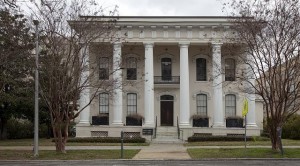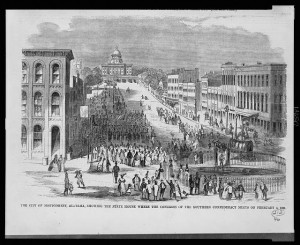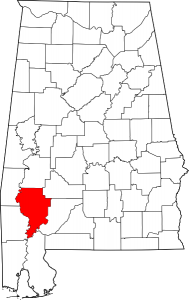War crisis requires more state power
150 years yesterday a Richmond newspaper reported on a message Alabama’s governor gave to the state legislature. The main points were 1) impress slave labor to fortify the state boundaries 2) the state government should develop and control Alabama’s salt resources, but allow other Confederate states to invest capital and labor in Alabama salt not on state reservations 3) money should be transferred to families of soldiers 4) some grain should be set aside for the production of medicinal alcohol 5) the Confederate government has the power to draft soldiers 6) the state militia should include all males between 16 and 60 not in the Confederate army.
From the Richmond Daily Dispatch November 6, 1862:
Message of the Governor of Alabama.
The Governor of Alabama, in his message to the extraordinary session of the Legislature of his State, in view of the exposed condition of some portions of the State, recommends such legislation as shall enable the State authorities to control the slave labor of the State for the purpose of constructing fortifications and other means of defence on the rivers and bays. He also recommends ample appropriations from the treasury to be made, in order to cover liabilities which may be incurred thereby, and all other outlays which may be deemed needful for the better protection and security of the State.
The Governor considers the question of supplying the people with salt one of very great importance, and recommends the appointment of a joint commission, empowered to visit the salt land, and examine the condition of the works and the conduct of those engaged, and all points connected with the business, necessary to enable the Legislature to approximate the cost at which salt can be made, and to as certain the best mode for developing the supply.
The prise of salt, he says, should be made uniform, if possible, and that if private parties are unwilling to accept reasonable profits upon their capital and labor thus employed, he would recommend, as the true policy, that the State take possession of all the works, with authority to press laborers and everything needed, and operate them under a regulated system for the common benefit of the people. In speaking of allowing the citizens of other States to manufacture salt for their own use at any of the works, except those on the State reservations, the Governor says:”United as are these Confederate States, in a common destiny, and mutually dependent, as they are, upon each other, I trust that the General Assembly of Alabama will concur in the expediency and propriety of inviting the citizens of other States to the salt supply which they may obtain within our limits by devoting their own labor and capital to its development.”
In behalf of the indigent families of absent soldiers a liberal appropriation is recommended, which should be disbursed without any invidious distinction among the needy families of absent soldiers, whether volunteers or conscripts.
On the subject of distilleries and the retailing of spirits, the Governor says:
“I recommend that authority be given for distillation of alcohol or spirits, which may be needful for medical uses within the State, and also, for whatever reasonable amount may be found to be the just proportion of Alabama, for a like purpose in the Confederate army. By confining the distilleries to localities where grain is abundant; fixing a reasonable price for the spirits; restraining by adequate penalties the parties engaged in the business, and those who may purchase from them for medical supplies, it is believed this object may be obtained without serious diminution of the supply of grain. And I recommend that the retailing of spirituous liquors in any city, town, or neighborhood, where State or Confederate troops may be stationed or rendezvoused, be prohibited during their sojourn, and that stringent regulations be adopted to accomplish this result.”
On the subjects of the Conscript law and the State militia, he says:
“But whatever doubts may have arisen as to the powers of Congress, all agree that the public exigency demanded the adoption of the most stringent measures to preserve the efficiency and increase the strength of the army.”
A reorganization of the State militia is considered indispensable, and a change in the military code is recommended, by which it will be made to embrace as militia all able-bodied male citizens of the State, above the age of sixteen and under the age of sixty years, who may not be actually engaged in the Confederate service.
I’m all ears when I hear anyone described as a disciple of fire-eater William Lowndes Yancey . In an excellent short bio of John Gill Shorter the Encyclopedia of Alabama points out that the governor (1861-1863) was elected on a platform of limited government, but the exigencies of the war made him pursue a much more active government. He was defeated for re-election. All of the concerns mentioned in his address are repeated in the encyclopedia.
Alabama’s Clarke County “was home to three of the most important salt works used during the Confederacy.” Salt prices rose so much during the war that the salt workers were paid in salt. When Mobile was rumored to have been captured, the workers fled; major salt production stopped.



